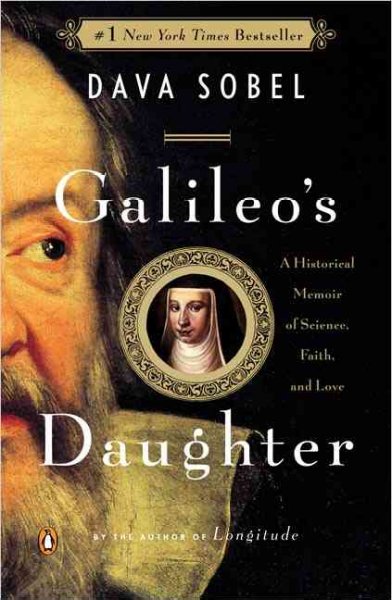Dava Sobel
Books: History | Science | Religion
Galileo's Daughter (1999), The Planets (2005)
Galileo’s Daughter: A Historical Memoir of Science, Faith and Love (1999)
 The eldest daughter of Galileo Galelei was a nun who remained in contact with her father through letters her entire life. Although Galileo's letter to her were destroyed after her death her letters to him were, for the most part, remain and were the basis for this book. If you're looking for a new non-fiction book, I'd recommend this.
The eldest daughter of Galileo Galelei was a nun who remained in contact with her father through letters her entire life. Although Galileo's letter to her were destroyed after her death her letters to him were, for the most part, remain and were the basis for this book. If you're looking for a new non-fiction book, I'd recommend this.
---
I read this a long time ago. Possibly soon after it came out.
So when I needed some non-fiction bedtime reading, I decided to read it again.
This book is based upon Galileo’s "124 surviving letters from the once-voluminous correspondence he carried on with his elder daughter" who at the time of their correspondence was the nun Marie Celeste. Interestingly, she and her younger sister became nuns because, as Galileo never married her mother, she herself was considered unmarriageable.
One of the things that makes this story so fascinating is that neither Gailieo nor his daughter every lost faith in God or their Catholicism.
"I render infinite thanks to God," Galileo intoned after those nights of wonder, "for being so kind as to make me alone the first observer of marvels kept hidden in obscurity for all previous centuries."
They may have disagreed with the politics of the papacy and cardinals of the time, but their faith was never in doubt.
Galileo’s conviction that God had dictated the Holy Scriptures to guide men’s spirits but proffered the unraveling of the universe as a challenge to their intelligence.
JUST AS SUDDENLY and unexpectedly as word of your new torment reached me, Sire, so intensely did it pierce my soul with pain to hear the judgment that has finally been passed, denouncing your person as harshly as your book…
My dearest lord father, now is the time to avail yourself more than ever of that prudence which the Lord God has granted you, bearing these blows with that strength of spirit which your religion, your profession, and your age require.
I think what makes this story so compelling is that despite everything that happened, neither lost their faith in God or Catholicism, no matter how much they disagreed with the council of cardinals edict against the Dialogues and Galileo himself.
Published by Bloomsbury USA
Rating: 8.5/10
The Planets (2005)
 Several years ago I read and thoroughly enjoyed Galileo’s Daughter, and when I found The Planets in paperback and a 4-for-3 sale, I decided to pick it up.
Several years ago I read and thoroughly enjoyed Galileo’s Daughter, and when I found The Planets in paperback and a 4-for-3 sale, I decided to pick it up.
The Planets looks at–unsurprisingly–the planets. Including (since it was published in 2005) Pluto. Although as a whole I thoroughly enjoyed it, there were some chapters I like better than others.
The chapters are dedicated to different planets, as well as a chapter on the sun/start of our solar system as well as a chapter for the moon. Each chapter looks at the planet in question in a different manner. I particularly liked the chapter on Neptune and Uranus, which includes a letter from Caroline Herschel to Maria Mitchell and the chapter on the moon, which looks not just at the moon but how the moon affects the earth and those of us on the earth.
I did not, however, like the tack she took with Mars, where the chapter was written from the point of view of a rock that was thrown from mars and eventually landed on Earth. And I wasn’t enamored of all the astrology that filled the chapter Jupiter.
All in all it was an interesting book, and I did learn lots of interesting facts about the various planets, but all in all I much preferred Galileo’s Daughter.
Rating: 6/10
